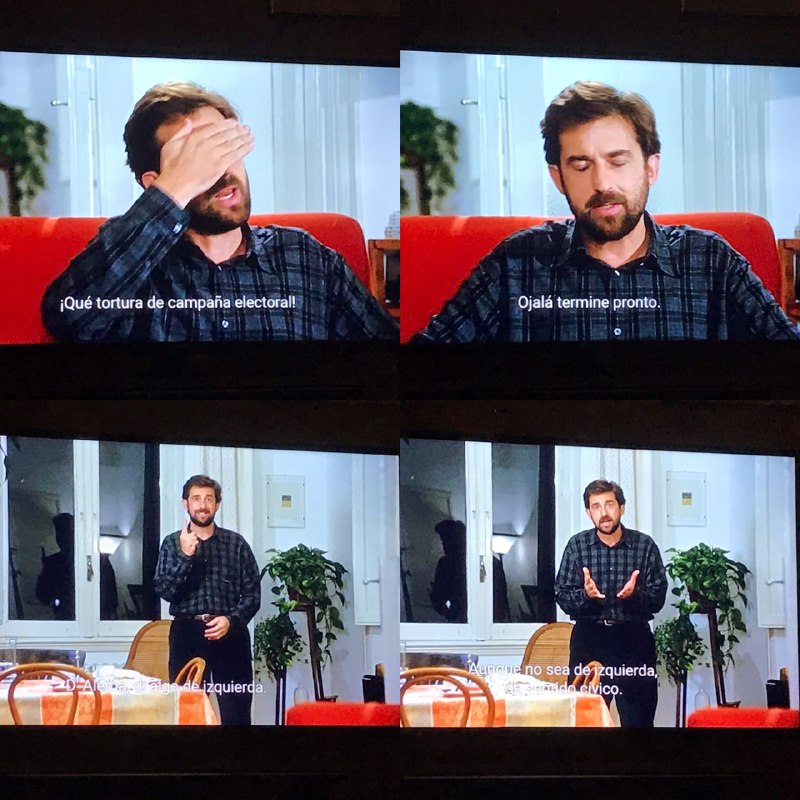In dog years, dear Danae, this pandemic will surely be about 18 years old. What have these strange months-years taught us? Nothing, of course. In their various local interpretations, it has only confirmed that liberal democracies continue to create a terrifying planetary oligarchy that no longer bothers to run for elections because public policies are rather their corporate policies.
Take a look, for example, at what appeared a few days ago on CNN (which, by the way, is also about a billionaire from the ’80s who now pales in the face of new fortunes): “Billionaires have never been richer despite the pandemic.” But not just any millionaire, says the note, it is about those “innovative billionaires.” The funny thing is that this very list of ultra-billionaire tech bros is part of the wealthiest 1% of people who, according to a new Oxfam report, is responsible for twice the CO2 emissions of the poorest 50% of the world’s population (something we already saw last month with the carbon footprint of Google executives).
But don’t talk about inequality, about immoral social class differences, because you automatically became a Stalinist with an iPhone. What to say about the civil movement for Internet freedom that parrots any regulation attempt can harm innovation.
But even more frustrating is, as always, the position of the left in all this. I saw the candidates’ debate for the US vice presidency, and it was embarrassing: Kamala Harris (ok, ok, we cannot call this left-wing but let’s frame it in the defective political parameters in the US) defending fracking (!) and reluctantly saying a word for the green new deal. Even more horrifying, leaving the field for Republicans, in the context of the climate crisis, to continue proclaiming their biggest fake news: the defense of workers.
By the way, for those of us who have just gotten into the subject, I highly recommend this article that weighs the green new deal (as a gringo political platform on global warming) and the movements for economic degrowth (not as a political platform but as a critical understanding of the evidence that no green technosolution can cope with the idea of growth as the only measure of economic success).
What is the role of technology in degrowth? Tom Medak says that, because technological innovation is driven by critical problems of capital, military, administration, and population management policies, and for that, it has the support of institutions, financiers, and governments, it is difficult for it to adapt to the needs of degrowth spontaneously. Unless, of course, we come up with a plan. And, surprise, there is no plan. We are at the gates of the abyss, and there is NO plan because the left is terrified, thinking that they are going to be labeled as lefties if they propose an orderly, transparent, participatory, supportive, and fair degrowth economic plan.
Ahhhh, Danae, in a few days, it will be the constitutional referendum in Chile. And I know we have already discussed our anguish and frustrations via chat about the whole process. Still, I just wanted to share a sequence from the film “Aprile” by the fav of favs, Nanni Moretti, which graphs, with dots and commas, my emotional state.

* The electoral campaign, what torture! / I hope it ends soon / D’Alema: say something left-wing! / Even if it is not left-wing, something in a civic sense
One and two hugs, friend. ¡No pasarán!
p.
Amiga Paz,
Greetings from Nice! This is actually a very special place for me, the French Cote d’Azur cured my spirit during my first winter in Europe, that was eight years ago when I lived in Bristol (Can’t believe it has been all these years!). Well, again I healed with the sun, with the blue beach and of course with the love I needed to face this very cuática week for Chile’s seudo democracy.
Still we have good news in the region, haven’t we? I’ve been very happy with the huge winning of MAS in Bolivia, I think this means good information for the interests of gato.earth industries, now Bolivians will have a left-wing government with indigenous communities at its core and tech bros shouldn’t have an easy option to extract the lithium they so desperately crave. Haha it has been also very cool too to see that now the US cannot even maintain their criminal and interventionist coups, what a sad nation.
I think these days have been good to leave cynicism behind and trust that things can change for the best. I connect this to a narrative that Naomi Klein and other activists are promoting: Klein considers that we’re living “the years of repair” this means that now we are in a critical moment in which we can repair part of the environmental and economic damage produced by capitalism, by neoliberalism and actually by most events of recent history. Maybe it’s not a bad idea to ascribe to that vision? I also think that it is a drive that represents a good opportunity to promote the concept of “repair”, an idea totally condemned in our current times of programmed obsolescence in which things are not fixed but sent to trash so you can buy a new device. This spiritual and environmental aberration is, in fact, the objective of the awful people from Tesla and their sustained lobby against their customers’ right to repair their cars because of “cybersecurity concerns”.
Of course, in order to execute a relevant process of repair, this should be done within a framework of legitimacy; it will be necessary to attach structural problems and not utilize a logic of “bugs” that should be patched as if that was the final solution. I connect that idea, with the Oxfam study you shared regarding the relation between income and emissions (The Carbon Inequality Era), I wanted to complement that document with this cool visualization made by Duncan Geere a nice lad who attended my most recent workshop at the ControlShift festival in Bristol. In general, I believe that in order to achieve this big goal of repairing, we will have to address the enormous structural inequities and, at the same time, we should promote different types of knowledge that challenge capitalist paradigms of accumulation. For instance I really liked to read in the twitter account of the Mapuche community in The Netherlands that the quillaja, a tree commonly used in Mapuche traditional medicine, could be a key component in the current research for a cure to corona virus I think that if we look towards those communities we’ll be able to find technological resources that can be extremely useful for all these urgencies we need to repair.
To close this letter, I’d like to share this interview to my teacher Rosi Braidotti, she speaks about how posthumanist logics can fulfill our desire for radical social transformations towards horizons of solidarity, a central part of this goal is the unavoidable critique of anthropocentrism that we have done so many times here in gatito. As usual, Rosi is super eloquent and clarifies, among other topics, why we need respect for theory and love for knowledge in order to fight tech monopolies and disinformation and hatred campaigns led by fascists.
Amiga, I love you so much, this week is especially full of anxiety but everything will be just fine. Let’s repair this mierda!
Danae

*Have this iconic painting by Henri Matisse, Chat aux Poissons Rouges. Yesterday I passed by the first house where Matisse lived in Nice, which happened to be the same house where a few years earlier lived my idol Antón Chéjov 🙀
In my utopia, I will impose mandatory trips to the sea in order to draw cats while you listen to the sound of the waves.